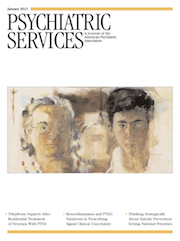Financial instability has been linked to increased risk of relapse, family burden and strain, substance abuse, and homelessness among people with serious mental illnesses. People with psychiatric disabilities often report not having enough money for basic necessities, and they consistently endorse financial management among their top personal goals. Financial well-being, on the other hand, is associated with greater quality of life, self-efficacy, and reduced psychiatric symptoms; therefore, financial management may be an important element of rehabilitation in this population. Studies of case management for people with psychiatric disabilities often include money management as a component due to its importance in living, social, and work environments. This report describes the outcomes of $teps for Achieving Financial Empowerment ($AFE), a recovery-oriented money-management intervention.
Seventy-seven adults volunteered to participate in the study. All had received a diagnosis of schizophrenia, bipolar disorder, or major depression and were receiving Social Security Administration benefits for psychiatric disability. Participants were recruited from mental health centers and state psychiatric hospitals in north-central North Carolina.Participants were administered the $AFE intervention, an individualized, psychoeducational intervention that teaches consumers with psychiatric disabilities how to save money, create a budget, avoid scams, access community resources, and work while receiving disability payments. Intervention length ranged from one-half hour to three hours, with a median of 1.5 hours.
Specifically, facilitators first review with disability recipients a list of ways to save money and which methods recipients have used in the past. Facilitators distinguish between expense needs (items needed to survive) and expense wants (items one wishes to buy), noting that if someone buys an item he or she wants but has not yet paid for expense needs, there is a risk of going into debt. Facilitators have disability recipients apply this principle to a budget exercise adapted from Boston University Center for Psychiatric Rehabilitation. Participants list income and expenses of a hypothetical case and are taught the fundamentals of creating their own budget. Next, using worksheets from the Social Security Administration (SSA), facilitators calculate how much disability income recipients can earn without losing disability benefits. Afterward, top strategies for avoiding financial exploitation from the National Fraud Information Center are reviewed, and participants are instructed that giving money for financial services as a result of a phone call, letter, Web advertisement, or TV advertisement raises risk of getting scammed. Finally, vocational and mental health resources in the community as well as the SSA Ticket-to-Work Program are described, along with steps for accessing community vocational rehabilitation.
Evaluation of the $AFE intervention consisted of baseline and six-month follow-up interviews regarding participants’ financial capacity, demographic characteristics, living situation, and clinical history. Demographic interview questions included information regarding living situation and current employment. The Brief Psychiatric Rating Scale was used to measure psychiatric symptoms. Items from theMoney Mismanagement Measure were used to measure debt, savings, and implementation of a budget. The Empowerment Scale was used to measure perceived self-efficacy.
At six-month follow up, 96% of participants reported implementation of at least one new major financial management skill, and over half (57%) reported implementation of five or more new skills. The most frequently reported implemented skills were saving on utilities (51%), coupon use (61%), eating out less (68%), using a coin jar (65%), and managing a budget (64%). Over half (55%) reported a significant increase in savings as a result of skill implementation. Six-month follow-up interviews revealed other financial benefits as well. Compared with baseline, participants at six-month follow-up were more likely to be working at least part time, more likely to be saving money, less likely to report being in debt, and more likely to be using a budget. Multivariate analyses controlling for demographic and clinical variables revealed reduced psychiatric symptoms and increased self-efficacy at six-month follow-up.
Randomized trials with financial measures to corroborate participant self-report are needed to further investigate the efficacy of the intervention. Study findings suggest that interventions focusing on improving financial management skills can assist individuals with psychiatric disabilities better meet the basic needs and improve their global functioning. In addition, it suggests that such an intervention could provide a cost-effective approach to help consumers become less reliant on disability funds and increase their likelihood to work, helping them to gain independence and maximize societal integration.

